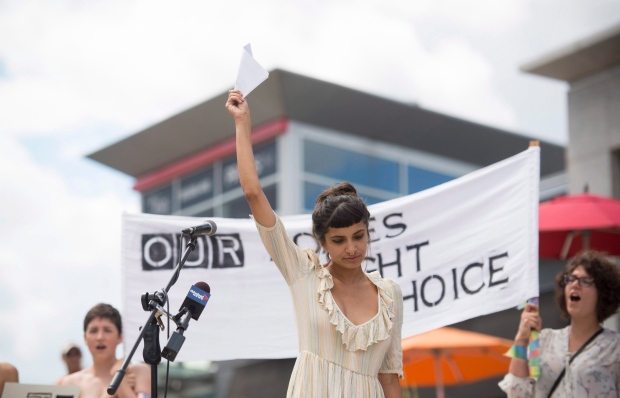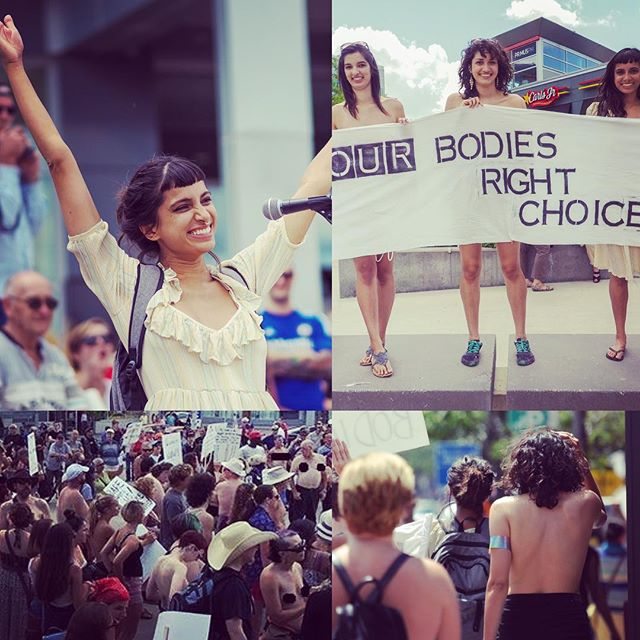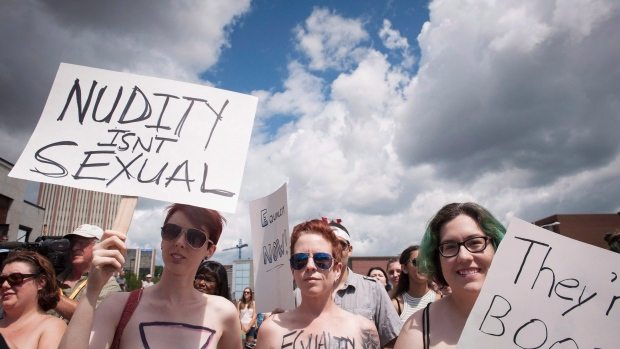Alysha Brilla and her two sisters held a rally on Saturday, August 1, 2015, called Bare With Us in an effort to stand against the sexualization of the female body.
The Bare With Us rally stems from an event that took place last Friday, on July 24, 2015, when Canadian singer-songwriter Alysha Brilla and her two sisters Tameera and Nadia Mohammed were enjoying a bike ride in Kitchener on a hot, muggy summer evening.
All three women were topless and minding their own business when they were stopped by a male police officer and asked to cover up their breasts because "it was the law." Angered and disturbed by the events, Alysha took to her social feeds to express her disappointment, which led to a media craze of national and international coverage.

Alysha Brilla speaks powerfully at the Bare With Us rally in Waterloo, Ontario.
Source: Hannah Yoon/Canadian Press
The Bare With Us rally was held in Waterloo Town Square on Saturday, August 1, 2015, and its purpose was to educate and create awareness for the Canadian police forces and public at large about every women's right to be topless in public — a law that has afforded them that right since 1996. It's not against the law for women to be topless in public in Canada, as is commonly believed.

Gwen Jacob speaks bare-chested at the Bare With Us rally in Waterloo, Ontario
Source: www.570news.com
The rally was attended by several hundred individuals, including Gwen Jacob. More than 20 years ago, in 1991, Jacob, a 19-year-old woman then, challenged the idea of toplessness by removing her shirt publicly, after which she was charged with indecency. When questioned about her actions, Jacob spoke about the double standards between men and women. Although she was convicted, her conviction was overturned by the Court of Appeal. Jacob's case determined that being topless is not indecent within the Canadian Criminal Code.
Jacob spoke at the rally and had Brilla, her sisters and all the women in attendance in tears. “We are raising our daughters in a rape culture,” Jacob told the crowd. “We are having a very important conversation around the world on rape culture and what it means.It is not the fault of the person who is experiencing that rage and that hate and that misogyny. If a cotton shirt could protect a child against a pedophile, I’d be handing them out," proclaimed Jacob to the crowd of over 400 people.
When asked to comment about the media reaction and outpouring of public support, Brilla could not hold back her happiness and excitement. "There's been so much support nationally and internationally and every single media outlet that has been reporting it has done so in a positive manner and light. The issue has been brought to awareness in a very good way," Brilla told ANOKHI Media. "There was so much support at the rally, but with that said, there are many who believe that women's breasts are purely sexual, which is not true. Breasts are also used to breastfeed babies as a way to provide sustenance and nutrition to newborns — a woman's body is far more than objects for sexual consumption. This rally is also happening in such a timely manner too, unintentionally, as its International Breastfeeding week from August 1st to 7th."

Source: Instagram
The protest was attended by men as well, who, along with many women, appeared with bare torsos to illustrate a basic right afforded to women by Canadian law — which in no way sexualizes their bodies for public consumption. In fact, it was the sexualization of the female body that became the real point of contention during the rally.

Protestors peacefully march at the Bare With Us rally in Waterloo, Ontario
Source: www.indepdent.co.uk
Aside from being a basic human right since 1996, a woman being topless in public and by her own choice is in no way an act of inappropriate behaviour or a display of her need or desire to be sexually desired by men. When Alysha, Tameera and Nadia were seen topless on the evening of July 24, they were topless because they wanted to feel comfortable on what was a very hot, humid and muggy evening in Kitchener, Ontario. They were by no means violating a law. But the police officer's stopping them and citing a law (which does not exist) to cover up their breasts was a clear attempt to control what is commonly considered "indecent behaviour."
When asked about her personal learning experiences from this situation, Brilla explained to ANOKHI Media, "I've realized that people are polarized when it comes to breastfeeding and women's bodies. Many of the negative reactions stem from a need to control and regulate how women should feel about their bodies and what they should do to them. That is not okay with me!"
"I have also realized how powerful our voices are, our tweets and a simple rally. It's been effective to help spread the message to the larger community. This is much more than women wanting to go topless, it speaks to the issue of rape culture, equality and women's rights on a very general level. It's about equality and respect for all human beings," said Brilla.
Why is it that a woman's breasts are seen as sexual objects in a public space?
Why are bare breasts mainly seen to be for the sexual consumption and arousal of men?
Why are women not as able to be topless in public as men are, without the negative social stereotypes and negative sexual connotations?
Comment below and tell us what you think of this situation.
Sources:
CBC News, 570 News, Alysha Brilla – Facebook
Photo Credit:
Featured Image: Hannah Yoon/Canadian Press
Daniel Pillai
Author
Daniel is the Digital Media Manager for ANOKHI MEDIA and the host for ANOKHI's entertainment channel, PULSE TV. As part of the dream team, Daniel manages all multiple channels under ANOKHI’s portfolio, while also training new on-air talent, and showing budding p...














































































































